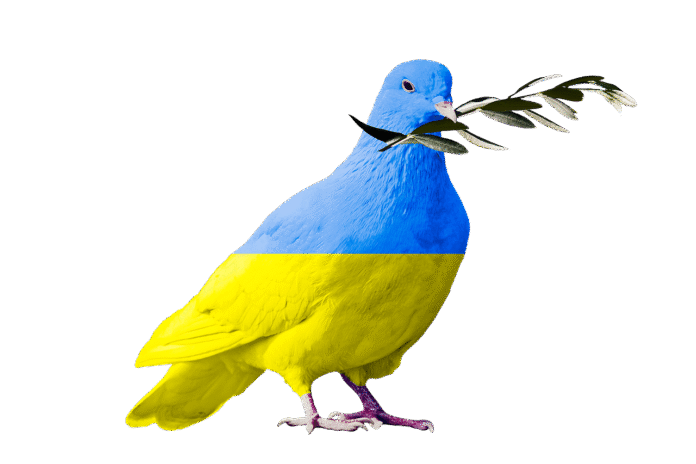Opinions are divided on what US President Donald Trump has achieved so far in his attempts to bring peace to Ukraine. One important fact seems certain: the US has pledged to continue providing security guarantees to Ukraine once the war with Russia is over.
Trump stated that the United States will help guarantee Ukraine’s security once a peace deal is reached and the guns fall silent. He said: “When it comes to security, there’s going to be a lot of help,” adding that European countries would be involved: “They are a first line of defence because they’re there, but we’ll help them out.”
He also however made it clear that this would not involve ground troops, but at most guarantees provided “by air”.
BREAKING: Trump claims UK, France, Germany will put boots on ground to secure peace but rules out US troops joining them
🔗 Read more https://t.co/nWkziTfaWg
— Sky News (@SkyNews) August 19, 2025
Bojan Pancevski, the Wall Street Journal’s Europe correspondent, called Monday evening’s summit between Trump and European leaders in Washington D.C. “a triumph for [Ukrainian President] Zelensky and his European backers.”
He states: “Here’re the highlights:
- Trump pledged US security guarantees to Ukraine & tasked Secretary Rubio with formalising them with a Euro/NATO task force.
- Zelensky accepted “land swaps” ie giving up territory IF America offers firm guarantees, incl boots on the ground.
- The 8 European leaders agreed on an elaborate role-play ahead of the summit. Finland’s Alexander Stubb (whom Trump called a “young and powerful man”) & NATO secretary-general Mark Rutte were in charge of talking territory. They used language familiar to Trump: they compared the land Putin is demanding to the US giving up Florida, and said the territory Russia occupied was like most of the East Coast. The Donetsk fortifications are like a “bastion against the Huns” they said. Trump seemed impressed.
- Trump had scheduled a call with Putin and elicited some sort of agreement from him to meet Zelensky. This should happen when the Rubio, the Euro natsec advisors and NATO’s Supreme Allied Commander hammer out the security guarantees in 1-2 weeks. Geneva was mentioned as location.
- Zelensky offered to buy 100bn worth of US arms via a NATO system known as PURL, using European cash. Trump said he wanted to invest in Ukraine’s drone industry and obtain tech transfer to the US.
- Trump asked everyone politely not to use the word ceasefire. They agreed to use the phrase “Stop the Killing” instead.”
NEW: Ukraine will promise to buy $100bn of American weapons financed by Europe as part of a deal to obtain US guarantees for its security after a peace settlement with Russia, according to a document seen by @FT.
w/ comrades @ChristopherJM @hallbenjaminhttps://t.co/hf2gbRpaYG
— max seddon (@maxseddon) August 18, 2025
What to expect from Putin?
The question is whether this is all not too optimistic. The first signals from the Kremlin about a possible meeting between Putin and Zelensky are not positive. Putin would rather not be seen with the leader of what Russian propaganda considers an ‘illegitimate regime.’
Fundamentally, Putin will consider territorial expansion important, as well as the historical and cultural aspects of his conquest, but ultimately his absolute top priority is to remain in power. The fact that he enjoyed a huge surge in popularity after annexing Crimea in 2014 – even opponents such as Navalny were ambiguous about this – will undoubtedly have played a role in his decision to launch the “special military operation” in Ukraine.
Keeping the conflict going is now the ideal excuse for Putin to fend off domestic criticism of corruption and mismanagement. So even if Trump were to offer Kiev to Putin in exchange for peace, it would be less advantageous for Putin than it seems.
NEW: The Kremlin did not publicly commit to a bilateral or trilateral leader-level meeting, contrary to US President Donald Trump's announcement following the August 18 multilateral summit.
Other key takeaways from our latest assessment ⬇️(1/2)
– Western leaders reaffirmed the… pic.twitter.com/1Cn5qH3tWo
— Institute for the Study of War (@TheStudyofWar) August 19, 2025
Is Russia going bankrupt?
A look at the domestic economic situation in Russia shows that serious storm clouds are gathering. Joren Vermeersch, a Belgian cabinet advisor to the Minister of Defence, explains how the Russian government budget will be heavily in the red this year:
“Barring a miracle (read: Putin using his head and agreeing to a ceasefire), Russia will be at least 5% and possibly even 7 to 8% in the red this year.
It should be noted that Russia cannot finance this budget shortfall through loans on the international capital market. The only way for Russia to sell bonds is by forcing its banks to buy them at extremely high interest rates (18%). But the banks no longer have the necessary buffers to do so. So the Russian Central Bank is creating new money and lending it to them. This is one of the reasons for the high inflation in Russia, despite insanely high interest rates: they are printing money at an insane rate.
Remarkably, this is a new phenomenon. In 2024, the Russian budget deficit was only 1.7% of GDP. On top of that, the national debt is rising enormously. Vermeersch again:
“Russia had hardly any national debt (they even had a substantial war chest of 350 billion euros, but that has since been squandered). Now the national debt is rising rapidly. It already stands at 35 to 40% of GDP, if you add up all the hidden government spending (loans from the Russian Central Bank to Russian banks to buy up bonds + the enormous subsidies to the military-industrial complex disguised as loans (a trick widely used in Russia to keep defence spending artificially low and thus embellish the budget).
In summary: On the one hand, Putin may want this conflict to continue for a while to divert attention from domestic problems. On the other hand, the war is creating ever greater economic challenges for his regime.
Western sanctions have certainly played a role in this, however much Russia has succeeded in finding alternative routes to sell its own raw materials.
Rather than new sanctions packages, the EU needs to show leadership on enforcing the existing ones – clamping down on EU exports being diverted via third countries to Russia chief among them. So far, very little evidence of it. https://t.co/vLSJQmX8Gh pic.twitter.com/0itSoLjWjc
— Daniel Kral (@DanielKral1) February 19, 2025
It seems that something is changing in this area, although it is still too early to say for sure. Russian revenues from fossil fuels fell by 18% in the second quarter of 2025 compared to the same period last year — the lowest quarterly figure since the invasion of Ukraine.
Recently, Trump has been less explicit about stepping up sanctions, but after Monday’s summit, French President Emmanuel Macron claimed that Trump is prepared to impose sanctions ‘if Russia does not cooperate’. ‘Secondary sanctions have also been put on the table,’ he added, referring to import duties on India.
Macron claims that Trump is ready to apply sanctions "if Russia doesn't play ball."
"Secondary sanctions have also been put on the table," he says, pointing to the tariffs on India.
— Jorge Liboreiro (@JorgeLiboreiro) August 18, 2025
Trump has indeed been increasing pressure on India lately, and not only in the context of his trade war. US Treasury Secretary Scott Bessent is threatening higher customs tariffs to pressure India to stop doing business with Russia. Peter Navarro, trade adviser to the White House, said on Monday that India’s purchases of Russian crude oil are financing Moscow’s war in Ukraine and must stop. He wrote in an opinion piece in the Financial Times: “India acts as a global clearinghouse for Russian oil, converting embargoed crude into high-value exports while giving Moscow the dollars it needs.”
Bessent: India has been a large buyer of sanctioned Russian oil that they then resell as refined products. They have not been a great global actor. 1/ pic.twitter.com/wM0zAaXCmi
— Tymofiy Mylovanov (@Mylovanov) August 2, 2025
The problem with sanctions
Fundamentally, the question is whether it is wise to put such pressure on India. Do we want to push the country into the arms of a Chinese-Russian bloc? Western countries are also still buying Russian energy. EU countries including for example Belgium, still buy 51 per cent of all Russian LNG gas exports.
The EU is also still the largest buyer of Russian pipeline gas, purchasing 37 per cent of the total, which is more than China (30 per cent) and Turkey (27 per cent).
JUST IN: The Financial Times reports that China and India are seeking to 'repair strained ties with high-level visits' and 'ease tensions amid Donald Trump’s trade war' pic.twitter.com/wasCRDPtNZ
— The Spectator Index (@spectatorindex) August 19, 2025
In her book entitled ‘Backfire’, French policy analyst Agathe Demarais takes a closer look at sanctions as a policy instrument. She provides an overview of the unintended side effects of modern – American – sanctions and export controls, describing the innovative techniques used by regimes to circumvent such sanctions.
She points out that there is indeed economic damage in Russia, but the question is whether this will ultimately have any impact on Putin’s war machine.
In September 2024, she wrote that the West’s 2022 plan to cause a balance of payments crisis in Russia by freezing the country’s central bank reserves had “failed” and that this “was clear … after just a few weeks”:
“Moscow’s continued sales of oil and gas meant that the country’s current account remained firmly in surplus, supporting the central bank’s efforts to replenish its coffers with (unfrozen) reserve assets. (…) The lesson here is that it is almost impossible to engineer a balance-of-payments crisis in a country that runs a huge current account surplus.”
Admittedly, things may turn out differently now, but if sanctions have failed to bring Cuba, Venezuela, Libya or Saddam Hussein’s Iraq to heel, it would be historically unique for them to succeed with the Putin regime.
‘Magnitsky’ – style sanctions?
So-called ‘Magnitsky’ sanctions against specific individuals involved in serious human rights violations or corruption may be an alternative sensible option. These kinds of sanctions involve imposing visa bans and freezing the assets of individuals responsible for or involved in crimes.
Given the enormous migratory pressure on the West, it should be obvious that the first to be denied entry to Western countries should be key figures from regimes responsible for the large-scale wave of emigration to the free West.
In practice, however, such sanctions do not seem to be very successful. A specific problem is that it is not always legally clear who the right people are, and the correct procedures are sometimes flouted. Last year, a Russian oligarch won a court case against the EU on this basis.
Non-Russians also risk sanctions. For example, Dutch businessman Niels Troost is the first EU citizen to have been sanctioned. Over three decades, he built up a lucrative oil business. His assets, and those of his companies, were frozen because he would have sold Russian oil above the ceiling price. Troost claims he was misled by an American business partner, Gaurav Srivastava, who allegedly convinced him he was a secret agent of the CIA, which would help Troost continue doing business with Russia. Troost argues that for this reason, he believed he had the support of the American government to ignore the price cap.
This looks somewhat naive for a savvy 30 year veteran of the Russian oil trade. One would think that at the very minimum, he would ask to see some license, or ask to meet an official. So far, his legal defence against claims that he knowingly violated sanctions has failed. In April 2025, UK Companies House disqualified him, under UK Sanctions and Anti-Money Laundering legislation. In the first place, being fooled by someone into violating the law obviously does not justify doing that.
The cooperation between Troost and Srivastava fell apart in May 2023, followed by a series of criminal and civil lawsuits in the U.S., Switzerland and the U.A.E. Troost’s own criminal complaint in Geneva was dismissed, and India’s High Court ordered a newspaper to reveal the identity of the financier of an article that Srivastava considers part of a smear campaign. The article portrayed him as a ‘fake CIA spy’ who would have claimed to have a secret American licence for transactions subject to sanctions. This shows how complex it is to determine who should or should not be subject to such ‘Magnitsky’ sanctions.
Alternatives to helping Ukraine
Other methods of helping Ukraine, such as freezing Russian assets, also raise questions. It could challenge the West’s status as a safe haven for securing property, and make wealthy individuals in the Arab world or Asia, for example, question whether it is a good idea to have their assets protected in Western jurisdictions.
Ukraine will receive €1.6B from profits on Russian Central Bank assets frozen under EU sanctions. 🇺🇦
The assets stay blocked, but the interest they earn can be used to help Ukraine.
For a strong Ukraine in a secure Europe. #StandWithUkraine pic.twitter.com/vMfIczsKPM
— European Commission (@EU_Commission) August 11, 2025
Valérie Urbain, CEO of Euroclear, the Belgian company that holds Russian assets, warned in June that opening this Pandora’s box could have serious consequences if we are not careful. She stated that this is the case “among other things because we are liable for the Russian assets on our balance sheet. We cannot allow that cash to be seized and be left with the liability and the legal consequences. That could even pose a systemic risk to the financial markets.” She added:
‘Everything must therefore be done within a proper legal framework. That is precisely what attracts international players to invest in Europe. We must take this into account. Everything must be done in a very controlled manner, especially now that Europe is facing enormous challenges in terms of ageing, sustainability and defence.’
There are many differences of opinion about sanctions and negotiations, but friends and foes alike agree that Western military support has in any case helped Ukraine to defend itself. If Putin continues to block all peace efforts, arming Ukraine is therefore the obvious path that Western countries must follow if they are looking for an option that has worked in the past.
Critics argue that this could drag the West into a direct conflict with Russia. Proponents counter that Putin has so far only bluffed in this regard. In any case, the utmost caution must be exercised, and all arms deliveries must be viewed critically, as must the ongoing problem of corruption in Ukraine. If the country wants to belong to the West, it must behave like a Western country.













